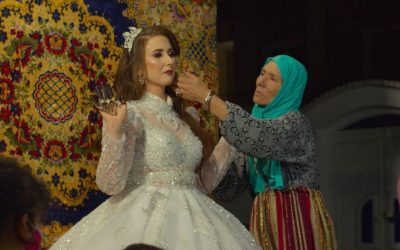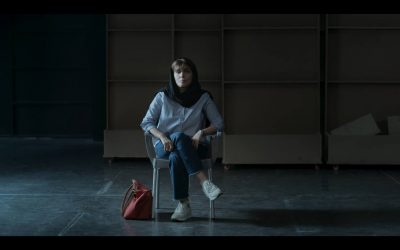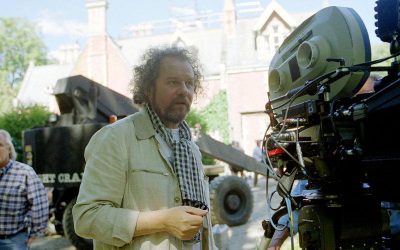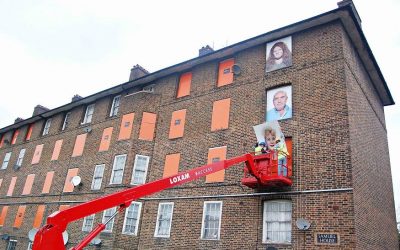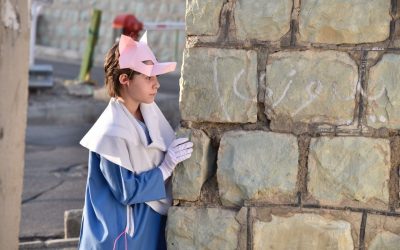COMPILED BY GERARD-JAN CLAES, STOFFEL DEBUYSERE
I consider what I do as, primarily, bearing witness to my society by way of cinema, with everything that it comprises regarding the contradictions between man and woman, law and practice… I don’t isolate the problem of women from the whole of the society. Selma Baccar was born in Tunis in 1945. After college, she studied psychology from 1966 to 1968 in Lausanne, Switzerland. At the age of 21, Baccar began to create films with other women at the Hammam-Lif amateur film club. Her first short film, made in 1966, was a black-and-white film called The Awakening that tackled women’s emancipation in Tunisia. She moved to Paris to study film at the Institut de Formation Cinématographique (IFC), after which she worked as assistant director for Tunisian television. In 1975, the same year as the UN’s International Women’s Year, Baccar directed her first feature film titled Fatma 75, which is considered to be the first feature film directed by a woman in Tunisia. In this “analytical film”, as Baccar has defined it, three generations of women and three forms of awareness are related — the period between 1930 and 1938 and the creation of the Union of Tunisian Women; the period between 1939 and 1952, which marks the relationship between the national struggle for independence and the women’s struggle; and finally, the period after 1956 to the present, concerning the achievements of Tunisian women with regards to the Code of Personal Status. “I conducted a series of historical researches, in particular on the participation of women in the struggle for independence and its achievements. I then measured the gap between the Code of Personal Status and its application in practice. Through this film, I wanted to demystify what is called “the miracle of the emancipation of Tunisian women”. Despite being funded by the Tunisian government, Fatma 75 was censored and subsequently banned from screenings in the country for thirty years. In 1990, she became the first woman producer in Tunisia with her production company Inter Médias Production. Selma Baccar’s activism for Tunisian women’s rights led her to an active political career. She also sat on the Assemblée Constituante that rewrote the Tunisian constitution in 2011 to include changes that were heralded by the UN as “a breakthrough for women’s rights”.
“The men in the street were a little amused to see a woman giving orders”
Interview with Selma Baccar
MAGDA WASSEF, 1978
TRANSLATED BY SIS MATTHÉ
Fatma 75 is the first feature-length film by Tunisian director Selma Baccar. Trained within the framework of the Tunisian Federation of Amateur Filmmakers, which produced several well-known filmmakers, Selma Baccar improved her technical and theoretical knowledge at the Institut de formation cinématographique in Paris. The Awakening was her first short film, made in the context of the Federation of Amateur Filmmakers in 1968. The film won awards at the Film Festivals of Kelibia and of Sfax and tackled the same subject as her second film: Tunisian women’s awareness of their situation as women. Fatma 75’s approach is quite original. The film is based on essays and histories written on the Tunisian feminist movement, using fiction to make its message accessible to the general public.
The presentation that Fatma, a university student, has to prepare serves as a pretext to plunge into ancient history and revive the famous women from Tunisian history: the wife of the Carthaginian general Hasdrubal, who, at her husband’s defeat by the Romans, prefers to kill herself and her two children rather than fall into the hands of the enemies as a slave; Sophonisba, a Carthaginian princess, who renounces her financé when he allies with the Romans; Kahina, the great figure of Berber independence; Jelajil, wife of Ibrahim Ibn Aghlab, who founds the first girls’ school in her palace in Kairouan, etc.
The modern movement for the emancipation of Tunisian women began in the 1930s following the publication of Tahar Haddad’s essay ‘Our Women in the Shari’a and in Society’. This book roused a passionate response and set a lot of tongues wagging. The fierce opposition by the traditionalists did not, however, prevent the birth of the Tunisian feminist movement and the creation of the Tunisian Women’s Union in 1938.
Fatma 75 tries to reconstruct this period of turmoil through fiction and documentary. One name deserves attention: Bchira Ben Mrad. She was one of the most important leaders of the Tunisian feminist movement, and her testimony in the film (she’s interviewed by Fatma in the context of her research) really clarifies this quite unknown period.
Three generations of women and three forms of awareness are recounted by the film: (1) the period between 1930 and 1938, which culminated in the creation of the Tunisian Women’s Union; (2) the period between 1938 and 1952, when a rather close relationship was established between the women’s struggle and the national struggle for independence; (3) the period after 1956 and up to the present day. The transition between these different periods occurs through Bchira Ben Mrad.
The achievements of Tunisian women with regard to the Code of Personal Status are considerable compared to those of Arab women elsewhere. Yet, the situation remains rather ambiguous. Under the cover of perfect liberation, each woman continues to suffer her specific situation as a woman, both within her family and outside it: the authorization of the father, brother or husband to obtain a passport and to travel, inheritance laws, etc.
The last image of the film shows a peasant woman with a bag on her back. Nothing in the life of this woman makes her different from her ancestors; she continues to suffer the same injustices and face the same status as a woman.
I met Selma Baccar in Tunis and, after seeing her film on the editing table, we talked about the circumstances of the shoot, the difficulties the film is currently facing with regards to its commercial distribution in Tunisia and abroad, and about her situation as a woman filmmaker in an Arab country…

Selma Baccar
“The idea of making a film about Tunisian women came from another filmmaker during the International Women’s Year in 1975. He suggested that I write a scenario on the subject and present it to the National Union of Tunisian Women to get their moral support, as they were an organization concerned with women’s issues. The union president agreed, so then I had to find the means to finance it. The Ministry of Information offered to finance one third of the film (the budget I presented was too high for them). That’s when my problems started: I had to find the rest of the money. I knocked on every door: family planning, the agency of cooperation, the technical services of the SATPEC [Tunisian Company for Cinematic Production and Expansion], which was managing the funding by the Ministry of Information. The film only cost 16,000 francs, which is about the cost of a news magazine or a short film. The shoot lasted for three and a half weeks on end. I had a crew of professional technicians as well as professional actors for the fictional scenes and people who recreated their own life for the other scenes.”
Magda Wassef The film you’ve just shown on the editing table seems to have quite a coherent structure. We’ve heard that certain cuts were required by the producers of the film… What reasons did they give for this? What is your position on it all?
Selma Baccar: The film was ready in September 1976, and I was thinking of presenting it at that year’s Carthage Film Festival. But the workprint was blocked by its main producer, the Ministry of Information, for three full months. In the end, after a meeting with the person in charge of cinema at the ministry, I realized I had to make a different film that had nothing to do with the one I had made and that fully respected the script accepted by the ministry. Some parts of the film were controversial, for example the sex education scene that I filmed in a school– although it is exactly as it takes place in reality – the importance given to the work of Tahar Haddad, and the interview with Bchira Ben Mrad, etc.
The CEO of SATPEC proposed I make two versions of the film: one in colour, to which I give my name and for which I take full responsibility, and the other in black and white, edited from the rushes and about 20 minutes long, to meet the requirements of the film’s producers. But I couldn’t make two contradictory versions of the same film myself. So, I finished my film as I conceived it. The SATPEC is taking care of its distribution after having made a standard print in May 1978. I’m currently working on the subtitles with Abdel Guélil El Bahi. But the film hasn’t obtained its certificate of approval by the censors yet…
Fatma 75 will be shown in the retrospective “Women in Arab Cinema” in Carthage. What’s your position on the policy of ACT [Association of Tunisian Filmmakers], the FTCC [Tunisian Federation of Film Societies] and the FTCA [Tunisian Federation of Amateur Filmmakers]?
I don’t want my film to be shown at the Carthage Film Festival for reasons analyzed in the declaration of these three associations: the condition for participation in the festival was for the Ministry of Culture to address the case of cinema. For example, we asked for box office figures, because we’re proposing that the cinema be self-financed through a part of the taxes on the box office, which would then be turned into a production fund. The work of the committee stopped more than a month ago and it’s still waiting for these figures.
It’s not gratuitous blackmailing we’re doing here by refusing to allow our films to participate in the Carthage Film Festival, but we find it absurd that Tunisia is organizing such an important film festival while Tunisian cinema is almost non-existent: each film is just a coincidence…
This is your first feature-length film, but you were a television assistant director. Could you tell us about the relationship you had as a woman with the world of film and television?
When I started working as a television assistant, some of my male colleagues were offended. One of them even told me: “You’ve come to take a job from us while there are already so many of us in need of work. You don’t need to work; you have a husband to support you.” On the other hand, the directors I worked with wouldn’t let go of me. At the beginning, the TV managers wanted to hire me as a scriptwriter or editor. They said the job of assistant is a man’s job… In any case, I personally didn’t find it particularly difficult to do my job, and the relationship with the technicians was excellent. Some men from outside the industry were hard on me. The men in the street were a little amused to see a woman giving orders…
As for my experience as a woman director, I think it was very important for me. My relationship with the crew and the actors was excellent. The shooting of Fatma 75 was “all roses”. On the other hand, in order to obtain the necessary funding for the production of the film, I felt a great mistrust from some of the people in charge, although I had a special card up my sleeve: a film about women made by a woman. But the problem of film production in Tunisia is the same for men and women: it’s negative for both of them. At ACT, we are fighting the same struggle so as to make sure that Tunisia will have a film policy.
Originally published without title in CinémArabe, 10/11 (August/November 1978).


